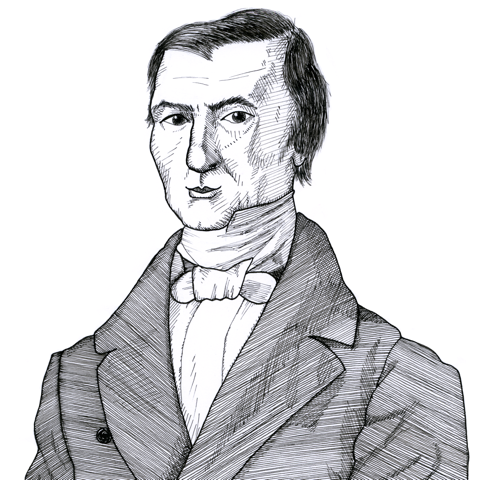
Quotes by Frédéric Bastiat
1801 – 1850
Frédéric Bastiat (1801-1850) was one of the leading advocates of free markets and free trade in the mid-19th century. He was inspired by the activities of Richard Cobden and the organization of the Anti-Corn Law League in Britain in the 1840s and tried to mimic their success in France.
Bio
Bastiat was an elected member of various French political bodies and opposed both protection and the rise of socialist ideas in these forums. His writings for a broader audience were very popular and were quickly translated and republished in the U.S. and throughout Europe. His incomplete magnum opus, Economic Harmonies, is full of insights into the operation of the market and is still of great interest to economists. He died at a young age from cancer of the throat.
See also our collection of extracts, essays, and other resources about Bastiat.
See the Liberty Matters online discussions on Bastiat and Political Economy and Reassessing Bastiat’s Economic Harmonies After 160 Years
For additional information about Frédéric Bastiat see the following: * in the Forum: Essays on Bastiat * at our sister website Econlib: the Concise Encyclopedia of Economics entry on Bastiat
For tables of contents of Bastiat’s Works:
- table of contents of the Guillaumin edition of the Works (in French)
- table of contents of LF’s translation (in English)
- table of contents of LF’s translation (in French)
- chronological list of Bastiat’s works
See the Timeline of the Life and Work of Frédéric Bastiat:
- Expanded and enlarged Timeline Part 1 (1801-1844) 123 KB PDF
- Expanded and enlarged Timeline Part 2 (1844-1850) 82 KB PDF
- JPG (1200 px, 410 KB)
- PDF (45 KB)
Origin of Government
Frédéric Bastiat, while pondering the nature of war, concluded that society had always been divided into two classes - those who engaged in productive work and those who lived off their backs (1850)
The State
Frédéric Bastiat and the state as “la grande fiction à travers laquelle Tout Le Monde s'efforce de vivre aux dépens de Tout Le Monde (1848)
The State
Frédéric Bastiat on the state as the great fiction by which everyone seeks to live at the expense of everyone else (1848)
Economics
Bastiat asks the fundamental question of political economy: what should be the size of the state? (1850)
Free Trade
Bastiat on the spirit of free trade as a reform of the mind itself (1847)
Free Trade
Bastiat on the most universally useful freedom, namely to work and to trade (1847)
Politics & Liberty
Bastiat on the many freedoms that make up liberty (1848)
Politics & Liberty
Bastiat on the need for urgent political and economic reform (1848)
Politics & Liberty
Bastiat on the fact that even in revolution there is an indestructible principle of order in the human heart (1848)
Parties & Elections
Bastiat on the scramble for political office (1848)
Economics
Bastiat on the state vs. laissez-faire (1848)
Food & Drink
Bastiat, the 1830 Revolution, and the Spilling of Wine not Blood (1830)
Economics
Bastiat on trade as a the mutual exchange of “a service for another service” (1848)
Liberty
Bastiat’s has a utopian dream of drastically reducing the size of the French state (1847)
Law
Frédéric Bastiat asks what came first, property or law? (1850)
The State
Bastiat’s Malthusian theory of the growth of the state (1847)
War & Peace
Bastiat on disbanding the standing army and replacing it with local militias (1847)
Free Trade
Frédéric Bastiat’s theory of plunder (1850)
Socialism & Interventionism
Frédéric Bastiat argues that socialism hides its true plunderous nature under a facade of nice sounding words like “fraternity” and “equality” (1850)
Socialism & Interventionism
Bastiat criticizes the socialists of wanting to be the “Great Mechanic” who would run the “social machine” in which ordinary people were merely so many lifeless cogs and wheels (1848)